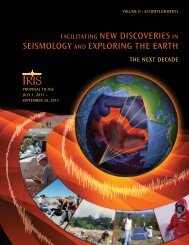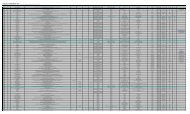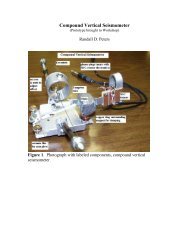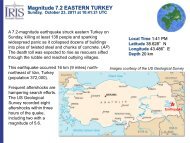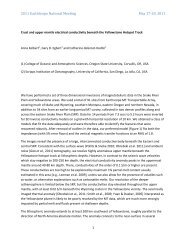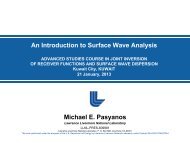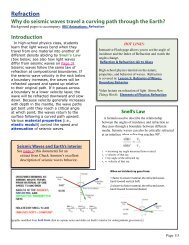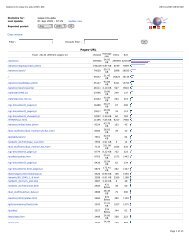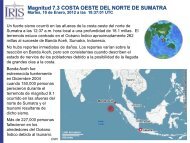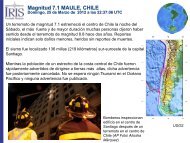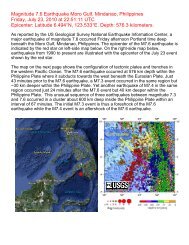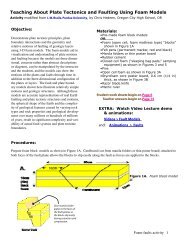Download 9.3 Mb pdf - IRIS
Download 9.3 Mb pdf - IRIS
Download 9.3 Mb pdf - IRIS
You also want an ePaper? Increase the reach of your titles
YUMPU automatically turns print PDFs into web optimized ePapers that Google loves.
only to the PI or his designated representative for a period of<br />
two years after the completion of the experiment. After that,<br />
the data will be made available to the public.<br />
be provided by the DMC to the PI. The PI can share the<br />
password with anyone he/she wishes. The PI will be notified<br />
when anyone registers for access to a proprietary dataset.<br />
Short Period (Triggered)<br />
Short period experiments are generally different from broadband<br />
experiments in both the amount and the bandwidth<br />
of the data they produce. Short period sensors are generally<br />
run at higher sample rates than broadband sensors, and the<br />
ability to record low frequency signals is very limited. As<br />
the short period data are typically recorded in a triggered<br />
mode, their principal archive will be as event data. The time<br />
windows should be long enough to include a reasonable<br />
amount of pre-event noise signal as well as all of the significant<br />
seismic phases for the event. As above, the data should<br />
be delivered to the DMC for distribution in SEED format.<br />
The PASSCAL field computers have the necessary software<br />
for this delivery.<br />
Reflection/Refraction<br />
Reflection/Refraction experiments differ from the above<br />
experiments in that they nearly always involve active<br />
sources. The receivers are typically arranged in regular one<br />
or two-dimensional arrays. The accepted data format for<br />
these active source experiments is conventional SEG-Y<br />
format. The data should include all of the necessary information<br />
on the geometry of the experiment (metadata) and they<br />
should be corrected for all known timing problems.<br />
Information about the experiment such as station locations<br />
and characteristics will be made publicly available during the<br />
experiment, only waveform data will be limited in distribution<br />
during the proprietary period.<br />
All passive experiments with five or more stations will<br />
designate at least one station as and “open station”. The<br />
data from the “open station/s” will be made available to<br />
the public immediately upon being archived.<br />
Support Available from <strong>IRIS</strong><br />
Every field computer has the software necessary to accomplish<br />
the data delivery task, and the PASSCAL Instrument<br />
Center has personnel who can provide assistance to the PI<br />
during and after the experiment. The Instrument Center also<br />
has software, computers, and large disk systems available for<br />
use by the PI. The Data Management System has additional<br />
facilities and support available to the PI. The PI is encouraged<br />
to utilize these resources at all stages of the work. In all<br />
cases, however, the ultimate responsibility for delivery of the<br />
data rests with the Principal Investigator. The PI must ensure<br />
that adequate resources are budgeted to accomplish this task.<br />
Non-Standard<br />
There will always be some experiments that do not fit<br />
directly into one of the above categories. In those cases the<br />
exact form of the data delivery will be negotiated between<br />
the PI, the <strong>IRIS</strong> Data Management System and PASSCAL.<br />
Proprietary Data<br />
Data of all types should be delivered to the DMC, in the<br />
appropriate format, as soon as possible and normally<br />
well before the general release of the data. The DMC will<br />
only allow access to the waveforms to the PI and others<br />
designated by the PI. Access will be by password that will<br />
A PASSCAL data submission is not considered complete<br />
until both the PASSCAL and DMS Program Managers certify<br />
that the information contained in the report is sufficient<br />
to allow other members of the community to utilize the data.<br />
<strong>IRIS</strong> will not certify that it has received data from any PI<br />
until the data submission is deemed usable.<br />
This policy is effective as of November 18, 2004 and is<br />
subject to change and revision as needs dictate. For updated<br />
versions of the policy and additional information on data<br />
delivery see the PASSCAL and DMS pages on the <strong>IRIS</strong> web<br />
site (http://www.iris.edu).<br />
58



